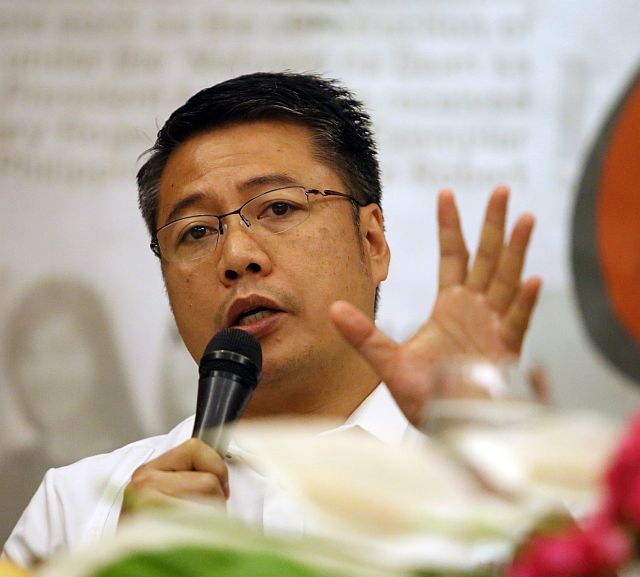
RUIZ
In the adjoining drug-prone villages of Pasil and Ermita, where government operatives had seized some of their biggest shabu (methamphetamine hydrochloride) hauls ever in Cebu City, the illegal drug trade proliferates amid relentless government efforts to stop it.
And the Philippine Drug Enforcement Agency (PDEA) knows just whom to blame: barangay officials who are “uncooperative” in the antidrug campaign.
To add to this, closed-circuit television cameras (CCTV) installed in a village sitting right next to Ermita — Barangay Suba — are believed to be used not for village security but by drug dealers as an early warning system against incoming cops.
Because of this problem, Cebu City Mayor Tomas Osmeña said that he was impressed that police were still able to track down suspects in those villages.
The past few days saw PDEA and police operatives conducting massive antidrug operations in Cebu City, zeroing in on known drug havens like Ermita and Pasil.
“I will talk to PDEA on whatever they should do. They should file charges. I will support it,” Cebu City Mayor Tomas Osmeña said on Wednesday following pronouncements made by PDEA Central Visayas
Director Yogi Ruiz that Ermita barangay officials did not cooperate with the agency when it operated against a shabu tiangge in Sitio Bato last Sunday.
Ruiz had threatened to file suits against the village officials for alleged dereliction of duty, a claim promptly denied by Ermita Barangay Captain Felicisimo Rupinta who said that they were just waiting at the barangay hall for PDEA to contact them at the time of the raid.
On Tuesday, operatives of the Cebu City Intelligence Branch arrested 53-year-old Melchor Ocarol and seized 1.25 kilograms of shabu worth P14.8 million in a drug bust inside his residence in Barangay Pasil.
Ocarol, who was considered a high-value target by the Cebu City police, is the brother of former Barangay Pasil captain and now councilman Romeo Ocarol.
Osmeña expressed no surprise.
“All I can say is that they’ve been long in our list,” said Osmeña, adding that he was careful not to announce Ocarol’s alleged involvement in the illegal drug trade to avoid accusations that he was politicking.
Suba CCTVs
A Suba barangay tanod interviewed by CDN said that there could be around 30 CCTV cameras scattered across the barangay although he was uncertain whether or not these were government-owned.
Deputy mayor on police matters, Cebu City Councilor Dave Tumulak, vowed to look into the presence of CCTV cameras in Suba and planned to request the CCTV supplier to submit the Internet protocol or IP address of the cameras so that recordings can be reviewed by City Hall.
“Every CCTV camera has its own IP address so what I will do is to request the supplier to hand it over for us to be able to monitor for a few days or months go. We will trace, we will see it,” Tumulak said.
If the supplier fails to provide the necessary information, Tumulak warned that the city will ban the operations of the CCTV provider.
CDN tried to contact Suba Barangay Captain Joel Sable regarding the presence of CCTV cameras in his barangay, but calls to his mobile phone could not be connected, while he was also not around when the barangay hall was reached.
Ermita, Pasil and Suba are among Cebu City’s seaside villages.
Coastline monitoring
Over at the Philippine National Police (PNP) headquarters in Central Visayas, police regional director Chief Supt. Noli Taliño revealed that Cebu’s coastline is being constantly watched by PNP to guard against the entry of illegal drugs.
“Cebu has a very long coastline. We’ve been monitoring the island, but of course, we could not guard everything,” said Taliño while admitting that despite government’s relentless campaign against illegal drugs, there are still those who manage to transport shabu to Cebu.
“Nonetheless, we still managed to seize quite a number of illegal drugs,” he said.
Taliño earlier received reports about the presence of shabu laboratories in Central Visayas, but upon validation, none was found.
“So far, we have not seen any shabu laboratory in Cebu and in the region,” Taliño assured.
The regional police chief also said that despite having seized about P46.8 million worth of shabu in two days, local cops do not want to rest on their laurels.
Instead, Taliño yesterday urged policemen to aim for more and not to relax.
Due to government’s relentless campaign against illegal drugs, Taliño said that the supply of shabu in Central Visayas has decreased as evidenced by a rise in street prices to three times the cost before.
“There should be no letup in our campaign. Expect more operations in the coming days,” he said in a news conference at his office.
Hours after Ocarol was arrested on Tuesday, PDEA agents also seized two kilograms of shabu valued at P32 million from Maria Diaz after Diaz sold shabu to an undercover agent inside her condominium unit in Barangay Guadalupe, Cebu City.
Although they have the same surnames, Diaz is not related to the slain drug lord Jeffrey “Jaguar” Diaz, said PDEA-7 spokesperson Leia Albiar.
Diaz and Ocarol are facing charges for violating Republic Act 9165 or the Comprehensive Dangerous Act of 2002, particularly for selling illegal drugs.
The offense is non-bailable.
Lapu-Lapu City
Meanwhile, 14 people were arrested in different police operations in Lapu-Lapu City on Tuesday.
The string of raids and buy-bust operations conducted in Barangays Pajo, Gun-ob, Pusok and Mactan resulted in the confiscation of several packets of shabu, P1,400 cash believed to be drug proceeds and a .38 caliber revolver.
Police identified the suspects as Jeny Lapa, Michael Alcordo, Edsel Naces, Rommel Ymbong, Renante Brigoli, Merninda Sabido, Celso Gorpido, Jonas Quiñones, Jocel Rota, Jerome Dinglasa, Lito Patinga, Dante Cabigas, Gerlon Minglanilla and a 17-year-old boy who was later turned over to the Women and Children’s Protection Desk (WCPD) after he was caught in a pot session in Barangay Pusok along with eight grown0-up men.